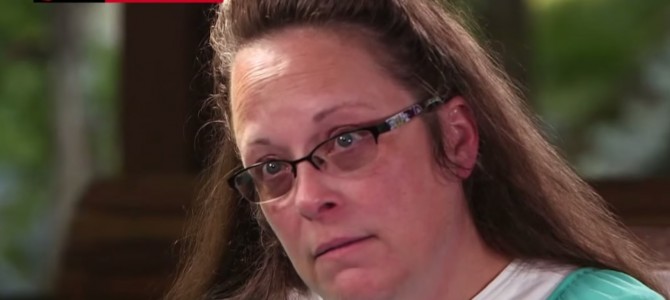
Somehow, a local controversy involving a county clerk in Kentucky provides the opportunity to revisit the Obergefell decision before the ink is dry on the Supreme Court’s opinion. Kim Davis—whether you find her actions obstinate, principled, or poorly expressed—has raised a question that seemed to have been safely filed away.
The question, a fundamental one, has to do with the nature of law. Many were surprised to hear that the seemingly progressive Pope Francis took time to visit Davis, but his decision is fitting. By meeting with Davis, the pope demonstrated solidarity with her cause and concern for her situation.
For almost two decades, I have been a student of and then advocate for religious liberty. I spent my summers in law school writing pamphlets and briefs and otherwise pressing the cause of free exercise. But despite my deep commitment to religious liberty, when I heard about Davis’s case I was less than supportive. It may have been my legal training, but I saw a bad case.
My ideal is something like the husband-wife team running the Sweet Cakes bakery. They were just two private citizens, trying to live their lives and provide for their family, when an intrusive state came after them for their religious beliefs. That case has good facts, sympathetic clients, etc. You’d like to go to court with that one.
With Davis, I saw a person employed within the apparatus of the state government. Her job is to process marriage licenses. The Supreme Court has ruled that the right to same-sex marriage is fundamental. Therefore (leaving aside the possibility of accommodation), she probably should perform her part of the process or resign. I have expressed that opinion in various fora. Perhaps unsurprisingly, many of my fellow Christians have been disappointed with that view. That disappointment has caused me to reflect more deeply on the nature of law.
Law Isn’t Just Rules People Generate
When we look at the laws of our country, we tend to see the product of human effort. We host campaigns and elect officials. Some of those officials appoint judges. Elected officials (and sometimes judges) create laws. We view ourselves as having given consent to those laws because long-established procedures have been followed.
Here is the crux of the issue. Law is more than a set of rules generated by human beings working under the auspices of the government. It almost has to be more than that, despite what Justice Holmes thought. Consider a couple of examples.
When World War II ended, German soldiers and officials who had committed or participated in various atrocities had to answer for their crimes at Nuremberg. They had not violated the laws of their government. So why were they being tried? They were being tried according to some higher standard than the laws of their country.
Where did that standard come from? If you say it came from the Allies who won the war, then you are saying the Allies merely imposed some kind of winner’s justice. But I doubt many of us would settle for that idea. We believe the war criminals received punishment because they did wrong. Not some artificial or socially useful wrong, but real wrong, a wrong that transcends formal political rules.
Martin Luther King Jr addressed his Letter from Birmingham Jail to white ministers who thought King had gone too far in planning protest activities that were unlicensed and illegal. They were thinking about the Christian emphasis on submission to government authorities (Romans 13) and wondered why King did not comply and delay his protests. He famously responded by looking to the work of Christian thinkers (Augustine and Aquinas, for example) to distinguish between just and unjust laws. The letter is widely admired and continues to stand as an important reminder of the priority of true law over the kind that is merely man-made.
Bring Me A Higher Law
Whether you agree with her or not, Davis stands in the tradition of appealing to a higher law. Many fair-minded people will look to the examples I highlighted above and say, “Yes, such a tradition exists and is indispensable, but I don’t agree that Kim Davis’s refusal to participate in licensing same-sex marriages fits with either Nuremberg or Martin Luther King Jr.”
Does the Supreme Court’s decision to expand the definition of marriage to include same-sex pairings resemble historic evils such as genocide or segregation? If we are talking about the harm done or the rights violated, then I say no.
However, I am not seeking to make a point about the scale of harms. I am making an argument about the nature of law. The Supreme Court redefined marriage. The four dissents (especially the chief justice’s opinion) clearly highlight the nature of what occurred. Five lawyers out of nine who serve on an unrepresentative court imposed their own view of marriage on the nation. The word “lawyers” is important, because while people who go to law school should have a greater ability to interpret laws, there is nothing about the experience that would necessarily impart knowledge of the true, the good, and the beautiful.
That male-female marriage is actually prior to the state and the state would not exist without marriage is a strong argument. Aristotle argued as much. In other words, marriage creates the state rather than vice versa. Further, I would argue that the case Justice Kennedy made about the evils of coverture, miscegenation restrictions, and laws prohibiting deadbeat dads from remarrying are all examples of states attempting to wrongly redefine the nature of marriage in line with political preferences. Seen in that light, the court actually committed the evil it purportedly deplored.
Kim Davis Has a Point
Given the short-circuiting of democracy, the fundamental redefinition of the oldest human institution, and the relationship between marriage and the design of the creator (the most obvious source of any “higher” law), Davis has a leg to stand upon. She may not be Gandhi or Martin Luther King Jr, but she is a reasonable candidate to appeal to the “big L” Law behind the law.
In addition to the question of the higher law, I think she and others can argue that the Supreme Court has delivered an unconstitutional decision. Chief Justice Roberts’ opinion illustrates the problematic nature of the narrow majority’s jurisprudence very effectively.
Because a case can be made both constitutionally and by appeal to a higher law that the court’s decision is incorrect, it would make sense within our system to have various officials (presumably more like governors than county clerks) refusing to make the ruling effective in their jurisdiction.
The best reason for them not to do so is that southern states’ decision to employ it in the service of slavery and segregation has sullied that tactic. Instead of extending the debate (and perhaps improving our understanding of the Constitution and its limits), it would only solidify the improper analogy between the gay marriage controversy and the struggle for African-American civil rights. The South’s poor choice of a cause left federalism weak and seemingly unappealing.
Finding a Way to Live Together
Let us say that we do not wish to re-litigate the issue, but instead that we want to focus on finding a way to live together as a people with a dwindling consensus on social issues. Religious liberty takes center stage.
One of the great benefits of religious liberty is that it offers us a way to deal with competing claims to moral and metaphysical authority. We can seek to accommodate the religious and conscientious objectors in such a way as to respect their right to exist and not to yield to a questionable new social orthodoxy.
Although many excitable new victors on the left would like to press their advantage and view religious liberty as some kind of license for haters, they should realize the cases that emphasized accommodation began with the old liberal Warren Court, the same one that expanded constitutional liberties and protections in a variety of areas.
The logic of accommodation allows a nation such as the United States to house members of both camps by reducing the friction between winners and losers. If we take a strong view of religious liberty, we encourage peace between citizens instead of war because we acknowledge their right to exist and to avoid crises of faith and conscience.
In the same way that the just war tradition encourages fighters to limit the means they employ in order to win so peace will be more easily achieved when the war is over, the logic of religious liberty may allow us to live together when substantive consensus is hard to come by. The nerves of our system are exposed, but religious liberty can serve as a balm.









